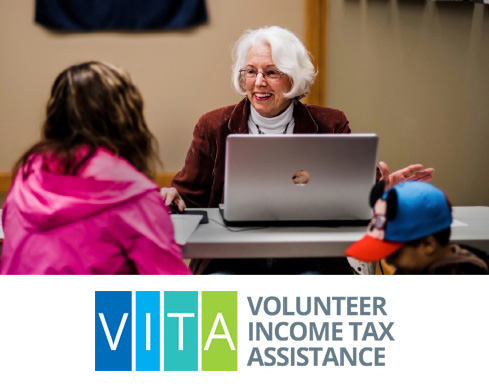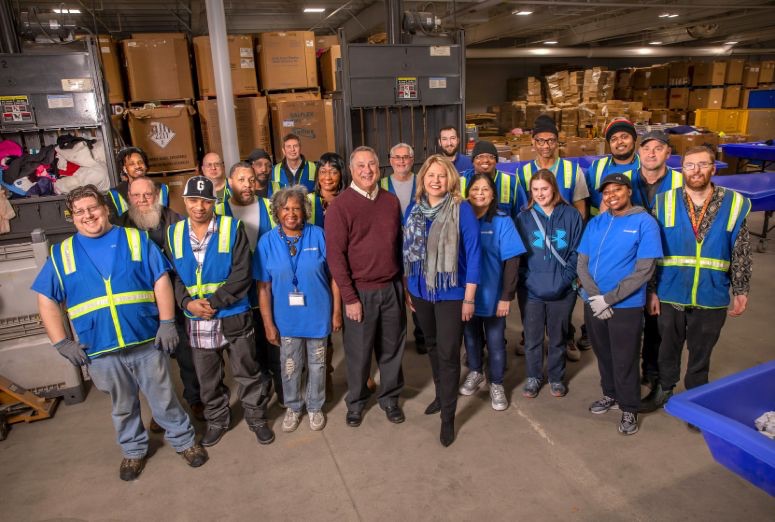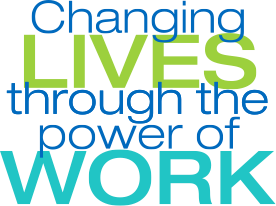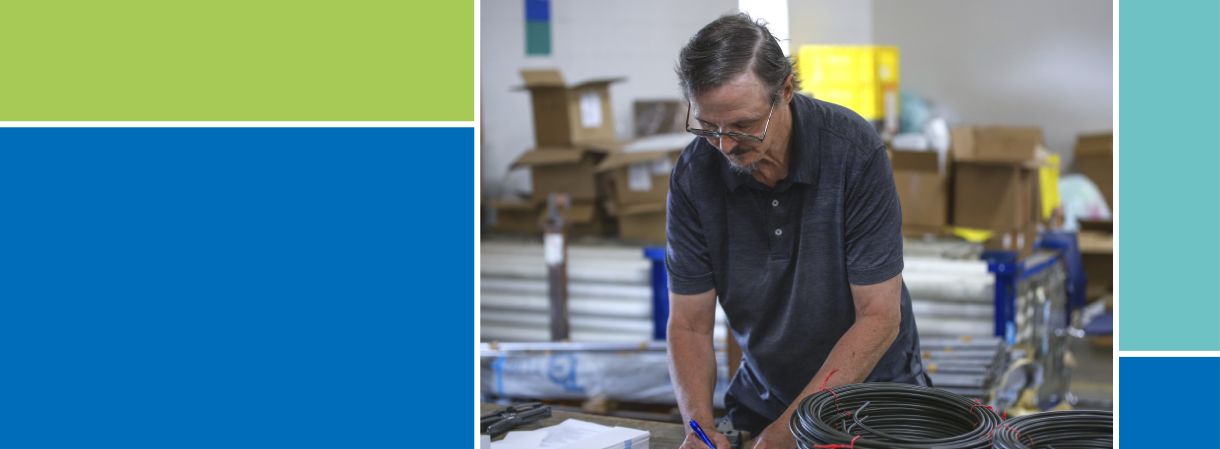Helping people prepare for, find, and keep good jobs is what Goodwill is about.
people were provided workforce development and support services in 2023
people placed into competitive jobs in the community
average hourly wage ($) of people placed into jobs through Goodwill
Hi Everyone –
We need to talk about the protests that are happening in our country and the underlying issue of racism. I write this because it is my responsibility to promote the vision and values of our organization. Our vision is that everyone has a pathway to meaningful and sustaining work, and all are included in this when both individual and systemic challenges have been overcome. Personal challenges include having a disability, illness, criminal background, or other disadvantaging condition. Systemic challenges include generational poverty, racism, discrimination, educational and economic inequities, and other long-term social injustices. In addition, two of our values are that 1) Every person is respected and valued and 2) Caring deeply about people, families, and communities is what motivates us. These are the things that are fundamental to Goodwill.
My strongest desire with this letter is to move hearts and minds to be open to better realization of our vision and values. Silence about race reinforces racism and so we have to speak. We need to talk about the white supremacy and racism that this country was founded upon and that continues with such abandon today.
To our co-workers of color, I want you to know that you are seen. The pain and frustration and fear and anger, I acknowledge. To those of us who are white: we do have the privilege of not experiencing racism. For more on this, Brene Brown’s description of white privilege is one of the best I have heard. Click To Read Story > Also know that this is not about guilt or shame. Guilt and shame ignite rationalization and defensiveness, and are not effective in changing anything. If you notice either of these feelings, let them pass through you, and then join in to do something to change things for the better. Because it is up to us, the white people, to change the reality of racism.
I have a friend whose husband died a number of years ago when their daughter was very young. That young girl is now 9 years old, and has been through a lot. The protesting is happening close to their home in a city in Michigan. Here is the conversation this 9-year-old girl had with her mom about the protesting as she was being tucked into bed:
Girl: You know I am sad for our city but I get being mad like that.
Mom: Oh you do?
Girl: Remember when daddy died and I broke all of those toys that day?
Mom: Yes.
Girl: I just had so much sad mad I didn’t know how to get it out. It was the only thing I could think of.
Mom: (remains quiet)
Girl: I bet it’s like that for them but way worse because they have been sad mad for so long.
Mom: I bet you’re exactly right…
“Sad mad” is great language for understanding that being mad can be a secondary feeling to grief, and this young, white child has used her experience to try to understand the experience of people who do not look like her. She has done a masterful job. My request is that you dig into your personal experience to do the same if you are not someone who experiences racism on a daily basis. Let’s take the wisdom and ability of a child to heart. We often reject the experiences of the other because we think we can’t relate, but if we look far enough, we can find the emotions and experiences to help us do just that.
Young black men are 20 times more likely to be hurt and killed by police than young white men. Anger about this is justified, and now for decades, we have failed at reforming police practices and our criminal justice system.
Violence is happening for so many reasons and perspective is important in understanding why. Trevor Noah does a great job of describing what happens when societal contracts break down, when people in power don’t uphold their end of the contract. He asks the question: “why should citizens uphold the law when the law enforcers themselves don’t?” Click To Watch Video > If that was all there was to it, we could understand the domino effect he talks about. But there are also times when the police have not handled the protesting well, and they have responded with violence against peaceful protestors. There are many accounts from reporters of police assaulting peaceful demonstrators. There are also accounts of white supremacists taking advantage of the protests to bring violence to black and brown people. Regardless of the genesis of violence in any particular protest, when we focus on “looting” and “rioting,” we distract from the actual issue of the systemic racism that poisons our country. Let me also suggest that we go forward not using the terms looting and rioting, because in many cases, the protesters and looters are not the same people, and rioting implies a meaningless eruption of violence. The protesters demonstrations are the opposite of meaningless. They are more of a call to action against the current conditions for people of color in our country.
So what can we do at Goodwill? We need to double down on our diversity and inclusion efforts. This means more resources, more measurements of progress, more conversations about race, more openness to understanding the experience of our colleagues as they navigate life under this reality. I know some of you might respond with, “but we should do this for everyone, everyone’s experience is important to understand.” Let me talk for a minute about all lives mattering.
When we respond with “all lives matter” to “black lives matter” we are missing the point. Saying black lives matter is not saying that others do not. It is reminding us that they do matter in an environment that seems to be demonstrating every day that they do not. We minimize the experience of racism when we respond with “all lives matter,” and imply that all lives are equally at risk, and they are not. A great example to understand this was given today in our executive meeting: if there are two people in the emergency room and one is having a heart attack and one has a broken toe, who should be taken care of first? Both people are experiencing pain, both need to be treated. In that way they are equal and if we leave it at that, I guess we flip a coin for who is treated first. But only one is at risk of death. The person with the heart attack could lose their life if something isn’t done. Black lives are at risk differently because of systemic racism — It is evident in the number of unarmed black people who die at the hands of police, it was demonstrated in the weaponizing of race by Amy Cooper (the white woman in Central Park who called the police on a black man who requested she leash her dog), and it is brutally apparent in the disparate impact of the novel coronavirus on people of color.
There are so many things that we can do personally to impact racism. The first is understanding and believing the experiences of people of color. Sensitize yourself to the human experience of our family, friends, neighbors, and co-workers who suffer the impacts of racism every day. Find a way to care deeply about all people and not only the ones who look most like you and who share a similar experience. Together, we can be better.
There is no way to shift from this topic easily, and so I very quickly want to offer my gratitude to all of our staff who made the opening of our Manistee and North Holland stores so successful this past week. We were well-prepared and our staff did an excellent job managing new processes and procedures, as well as the occasional disgruntled employee. You all have set the stage well for our continued reopening and I thank you.
My best to you all –
Jeanette
← Return - Employee Updates
Success Story: Caleb
Caleb’s journey with Goodwill has been nothing short of inspiring. Caleb embarked on a path of skill building that illuminated his determination and kindness. Caleb’s dedication shone through every task.
“Caleb is an extremely hard worker, and he is ready to take on new responsibilities,” says his Career Coach, Meg Barry.
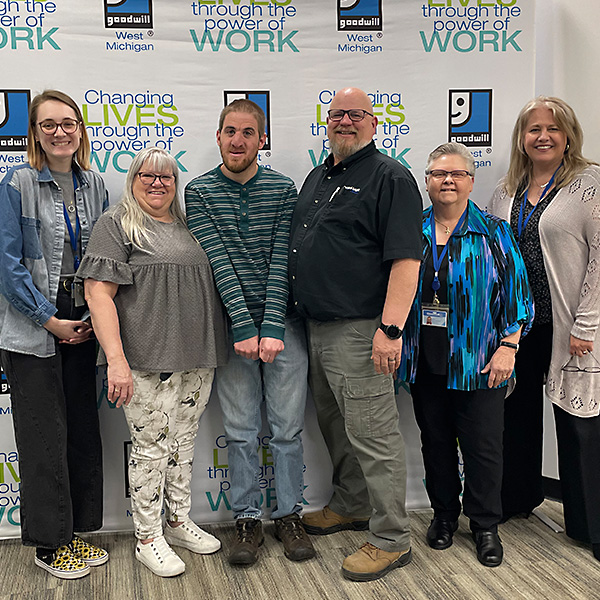
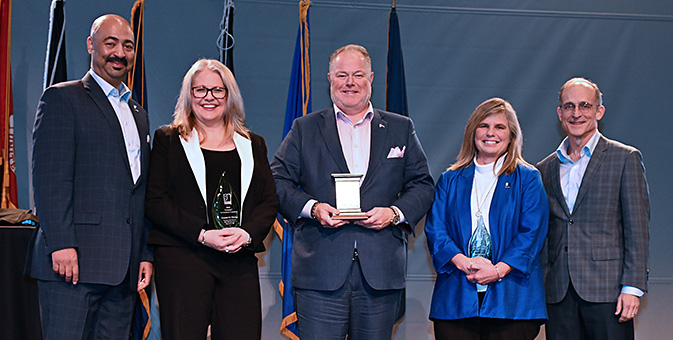
Hoyer receives international sustainability award
Goodwill President and CEO Jeanette Hoyer receives the prestigious Goodwill Industries International Sustainability Champion Award in recognition of her outstanding dedication to advancing sustainable practices and fostering a culture of environmental stewardship within the community.
Employee Spotlight: Kathy Krajkiewicz
For Kathy, Goodwill isn’t just a workplace — it’s her second home. Through her employment at Goodwill Industries of West Michigan, Kathy has achieved the dream of homeownership. Kathy’s infectious laughter and smile illuminate every room she enters.
Kathy shares her wisdom: “Find a job and get something you like – like I have at Goodwill.”
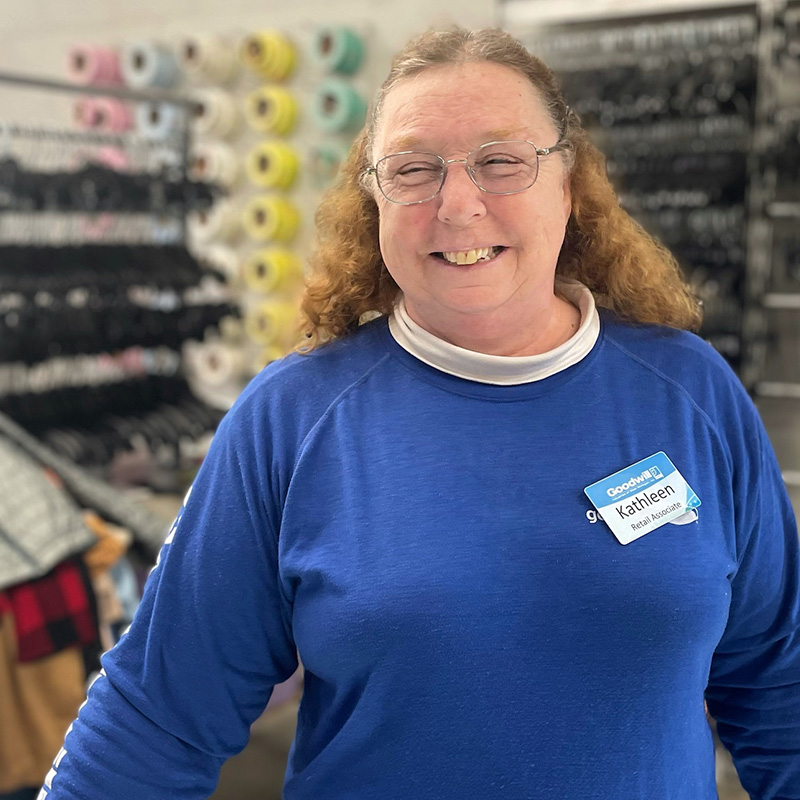
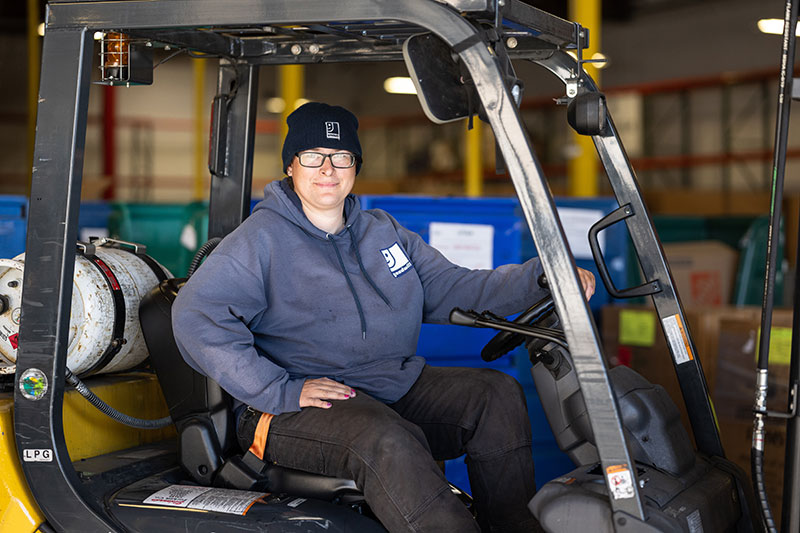
Goodwill awarded Barrier Removal and Employment Success grant
Goodwill was recently awarded a $568,595 Barrier Removal and Employment Success (BRES) grant from the Michigan Department of Labor and Economic Opportunity (LEO) to provide vocational certificate training in HVAC, forklift, and customer service.
Give your time. Change a life.
Become a Goodwill VITA volunteer!
Goodwill VITA (Volunteer Income Tax Assistance) volunteers provide free tax assistance to low- to moderate-income workers and families eligible for significant state and federal tax credits.
Make a difference! Help working people claim and keep all the refunds they are entitled to.
No accounting experience required! Volunteers receive FREE IRS training and certification.
Flexible hours! You can volunteer for day, evening, and/or Saturday hours in any of our tax-prep sites.
Call 231-722-7871, ext. 8482 for more information.
